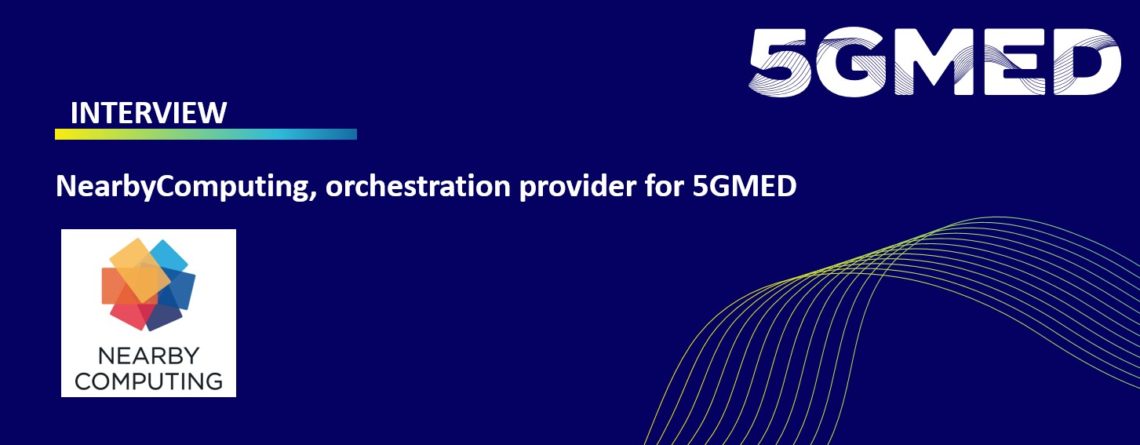Nearby Computing, orchestration provider for 5GMED
This article is part of an interview series on 5GMED partners to promote the various initiatives the project supports.
Nearby Computing (NBC) is a start-up company based in Barcelona, Spain, founded in 2018 as a spin-off of the Barcelona Supercomputing Centre (BSC) and the Technical University of Catalonia (UPC). NearbyOne is the flagship product of NBC, bringing the first all-in-one virtualized platform for deploying, managing and automating hybrid, heterogeneous and distributed IT systems, networks and applications. In addition, NBC’s state-of-the-art technology provides the capability of designing and executing innovative complex value-added end-to-end services.
Can you explain Nearby Computing responsibilities within the project?
In the context of 5GMED, NBC will be responsible for providing a seamless orchestration of the virtual components (i.e., from edge compute resources to 5G core network functions) that compose the heterogeneous 5GMED network infrastructure deployed by MNOs, neutral hosts, and road and rail operators, thus enabling the project to achieve its ambitious goal of bringing a sustainable 5G deployment model for future mobility in the Mediterranean Cross-Border Corridor.
What are the specific services that will be developed on the orchestration platform?
In cross-border corridors, MNOs, neutral hosts, and road/rail operators will have a separate network and compute infrastructures, each with its own service orchestration capabilities tailored to the specific business of each stakeholder. To address this heterogeneity, 5GMED envisions a distributed and lightweight orchestration framework that will leverage the capabilities available in each domain to provision and manage services, with the goal of minimising the manual configuration required in the various domains. The envisioned orchestration framework will provide the following functionalities:
- Deployment of services composed of virtualised network or application functions hosted in distributed edge computing resources located in the different operator domains.
- End device connectivity to the best wireless access technology available at a given location in the corridor, while always guaranteeing the reachability of the necessary application functions.
- Migration of application functions, along with their associated context, following the trajectory of the end device consuming the service.
- Support the deployment of AI-powered mechanisms to optimise in real-time the placement of network and application functions across the multi-stakeholder infrastructure.
Can you explain the importance of 5G technologies?
5G wireless technology is expected to deliver multi-Gbps peak data rates, ultra-low latency, higher reliability, increased availability, and customized service provision to applications with diverse requirements through network slicing. These unprecedented characteristics enable novel use cases and bring new vertical industries (e.g., automotive, energy, smart cities, etc.) to the telecom ecosystem.
What will be the impact of the project in short term and long term?
5GMED is expected to have a significant impact in 5G-enabled automotive scenarios. Short-term, 5GMED aims to build standardisation-oriented recommendations on 5G business-technology alignment and further development/optimisation for the tested UCs and 5G core technologies to relevant 5G and beyond standardisation bodies and industry alliances.: standardization, 5G application. Long-term, 5GMED will explore how its technical achievements can be brought to the market through accurate business models between all involved stakeholders (i.e., vehicle manufacturers, telecom operators, neutral hosts, public authorities, and road/railways operators). These models will help new entrant market players to develop and analyse the perspectives of potential win-win strategies based on the developed solutions.
How does this project contribute to cross-border collaboration between countries and institutions?
5GMED will demonstrate innovative CCAM and FRMCS use cases in the Barcelona-Perpignan cross-border corridor between Spain and France. This implies the involvement of seven countries and a cohort of different partners (i.e., big companies, research institutions, SMEs, etc.), who work towards the successful implementation of the project. The various sectors involved in the project, from the telecommunications domain to the transport and mobility sector, highlight the inter-disciplinary nature of the project and foster new collaborations and novel business models.
Could you explain the challenges in cross-border scenarios?
The main challenge in cross-border scenarios with regard to the orchestration domain comes from the heterogeneity of the deployments and the different regulatory frameworks that can potentially exist. 5GMED will try to overcome these challenges by providing a unified orchestration framework in order to provide seamless and transparent to end-user solutions to guarantee an uninterruptible user experience in cross-border use cases.
Do not miss our next interview, follow us on our social media for more.


